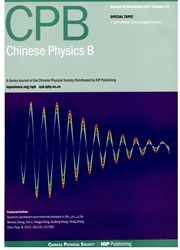

 中文摘要:
中文摘要:
Fluorescein/polyvinyl pyrrolidone (PVP) composite nanofibers with different fluorescein loadings (with a weight concentration of 0-5.0%) are fabricated via electrospinning. Morphologies, structures and photoluminescent (PL) properties of these straight, helical or wavelike fibers are characterized by scanning electron microscopy (SEM), fluorescence microscopy and a spectrophotometer. It is found that the maximum emission of the as-spun fluorescein/PVP fibers occurs at 510 nm. The PL intensity of the composite fiber increases with fluorescein concentration, then fluorescence quenching appears when the concentration reaches 1.67%. The mechanism of fluorescence quenching of fluorescein is discussed. In addition, the composite fibers exhibit a much stronger PL intensity than fluorescein/PVP bulk film owing to larger specific surface area, which makes them promising materials for biomedical applications such as probes and sensors.
 英文摘要:
英文摘要:
Fluorescein/polyvinyl pyrrolidone (PVP) composite nanofibers with different fluorescein loadings (with a weight concentration of 0-5.0%) are fabricated via electrospinning. Morphologies, structures and photoluminescent (PL) prop- erties of these straight, helical or wavelike fibers are characterized by scanning electron microscopy (SEM), fluorescence microscopy and a spectrophotometer. It is found that the maximum emission of the as-spun fluorescein/PVP fibers occurs at 510 nm. The PL intensity of the composite fiber increases with fluorescein concentration, then fluorescence quenching appears when the concentration reaches 1.67%. The mechanism of fluorescence quenching of fiuorescein is discussed. In addition, the composite fibers exhibit a much stronger PL intensity than fluorescein/PVP bulk film owing to larger specific surface area, which makes them promising materials for biomedical applications such as probes and sensors.
 同期刊论文项目
同期刊论文项目
 同项目期刊论文
同项目期刊论文
 Single-crystal SnO2 nanoshuttles: Shape-controlled synthesis, perfect flexibility and high-performan
Single-crystal SnO2 nanoshuttles: Shape-controlled synthesis, perfect flexibility and high-performan Quasi-aligned GA2O3 nanowires grown on brass wire meshes and their electrical and field-emission pro
Quasi-aligned GA2O3 nanowires grown on brass wire meshes and their electrical and field-emission pro Recent advances in synthesis, physical properties and applications of conducting polymer nanotubes a
Recent advances in synthesis, physical properties and applications of conducting polymer nanotubes a Sensing properties of infrared nanostructured plasmonic crystals fabricated by electron beam lithogr
Sensing properties of infrared nanostructured plasmonic crystals fabricated by electron beam lithogr Numerical and experimental investigation of kerf depth effect on high-frequency phased array transdu
Numerical and experimental investigation of kerf depth effect on high-frequency phased array transdu Adsorption and Desorption Characteristics of Nanozeolites as Adsorbent for Dimethyl Methylphosphonat
Adsorption and Desorption Characteristics of Nanozeolites as Adsorbent for Dimethyl Methylphosphonat Modelling and simulation of high-frequency (100 MHz) ultrasonic linear arrays based on single crysta
Modelling and simulation of high-frequency (100 MHz) ultrasonic linear arrays based on single crysta Synthesis, structural and gas sensing properties of nano-branched coaxial polyaniline fibers by elec
Synthesis, structural and gas sensing properties of nano-branched coaxial polyaniline fibers by elec Thickness dependence of stress in La0.9Sr0.1MnO3 monocrystalline nanofihrns using synchrotron radiat
Thickness dependence of stress in La0.9Sr0.1MnO3 monocrystalline nanofihrns using synchrotron radiat Electrospun europium complex/polymer composite microfibers and its modified photoluminescence proper
Electrospun europium complex/polymer composite microfibers and its modified photoluminescence proper Preparation and electrochemical properties of LiMn2O4 nanofibers via electrospinning for lithium ion
Preparation and electrochemical properties of LiMn2O4 nanofibers via electrospinning for lithium ion Recent advances in large-scale assembly of semiconducting inorganic nanowires and nanofibers for ele
Recent advances in large-scale assembly of semiconducting inorganic nanowires and nanofibers for ele Eu2+/Eu3+ -emission-ratio-tunable CaZr(PO4)2:Eu phosphors synthesized in air atmosphere for potentia
Eu2+/Eu3+ -emission-ratio-tunable CaZr(PO4)2:Eu phosphors synthesized in air atmosphere for potentia Nanofibrous patterns by direct electrospinning of nanofibers onto topographically structured substra
Nanofibrous patterns by direct electrospinning of nanofibers onto topographically structured substra Fabrication of highly ordered porous anodic alumina membrane with ultra-large pore intervals in ethy
Fabrication of highly ordered porous anodic alumina membrane with ultra-large pore intervals in ethy Synthesis, structural and photoelectrical properties of self-assembled gold-poly(3,4-ethylenedioxyth
Synthesis, structural and photoelectrical properties of self-assembled gold-poly(3,4-ethylenedioxyth Fabrication and photoluminescent properties of fluorescein/ polymer composite nanofibers via electro
Fabrication and photoluminescent properties of fluorescein/ polymer composite nanofibers via electro Current-voltage characteristics of individual conducting polypyrrole nanotubes: Space-charge- limite
Current-voltage characteristics of individual conducting polypyrrole nanotubes: Space-charge- limite Culturing Primary Human Osteoblasts on Electrospun Poly(lactic-co-glycolic acid) and Poly(lactic-co-
Culturing Primary Human Osteoblasts on Electrospun Poly(lactic-co-glycolic acid) and Poly(lactic-co- Light-Switchable Behavior of a Microarray of Azobenzene Liquid Crystal Polymer Induced by Photodefor
Light-Switchable Behavior of a Microarray of Azobenzene Liquid Crystal Polymer Induced by Photodefor 期刊信息
期刊信息
